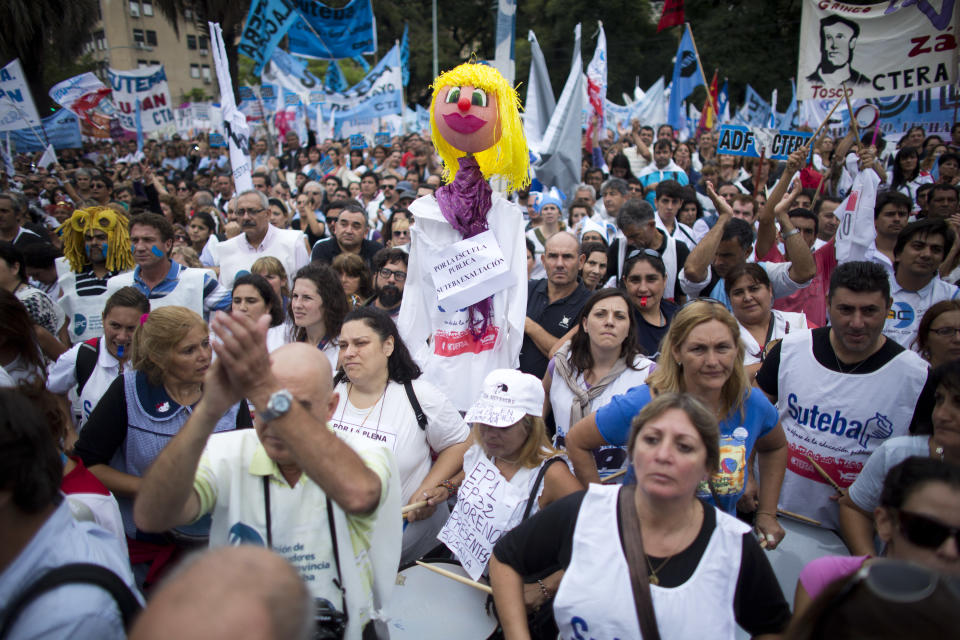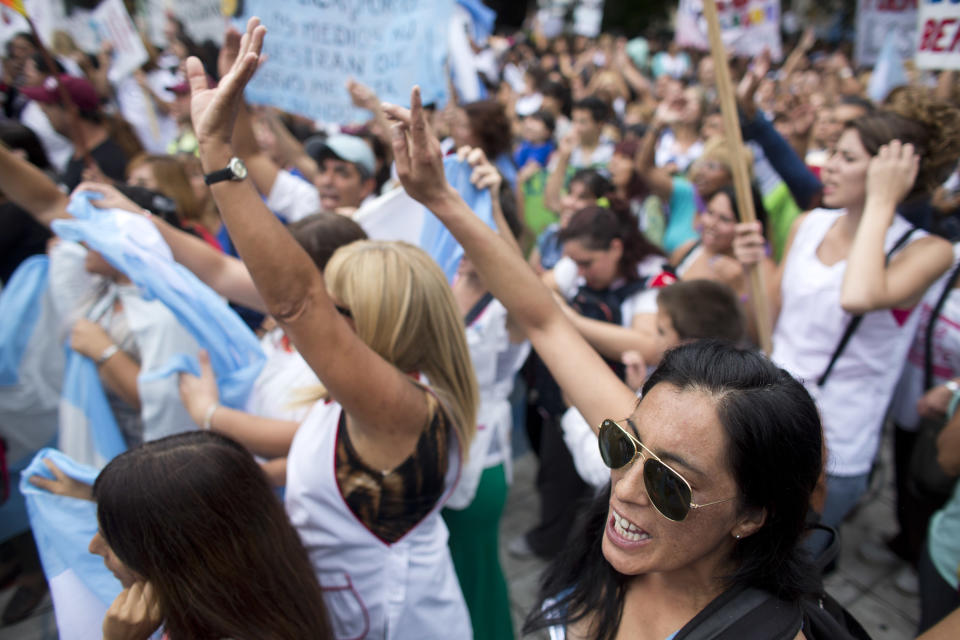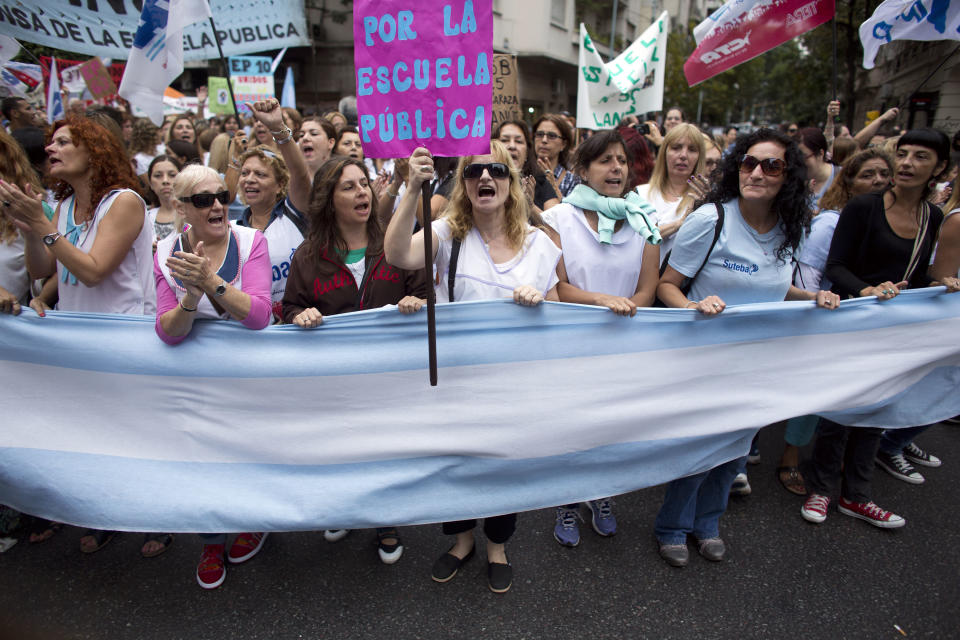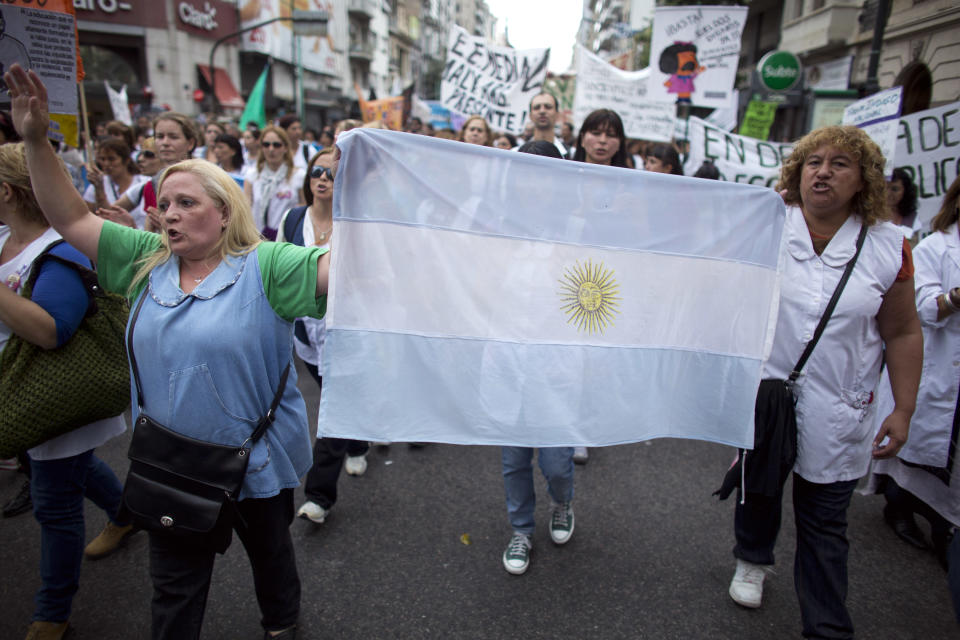Populist Argentine government begins painful cuts
BUENOS AIRES, Argentina (AP) — Argentina's cash-strapped government is cutting utility subsidies and trying to borrow for the first time in years as teachers, public health workers and other former allies take to the streets demanding pay raises to match some of the world's highest inflation.
The government has subsidized 80 percent of the cost of water, natural gas and other basic services for a decade as the economy recovered from a devastating collapse and debt default. Since taking office in 2007, President Cristina Fernandez added many more subsidies, seeking to stimulate the economy by transferring wealth to the poor.
"Millions of people have seen their salaries increase," Fernandez said in a national address Thursday night. "They've been able to buy a car, or air conditioning."
She insisted her model of "social inclusion" won't change, but called on Argentines to adapt to a "more rational use of energy."
Her economy minister, Axel Kicillof, said the reductions in utility subsidies would be carefully targeted to avoid hurting the poor, slowing economic growth or provoking even higher inflation. Factories and the poor will be exempt as will people living in Argentina's frigid south or arid north.
The cuts will be borne instead by businesses and middle-class consumers, who must reduce consumption by 20 percent to avoid paying higher bills. "We're calling it a reassigning of subsidies," Kicillof said.
That means a disproportionate load on the same kinds of people striking for pay raises to keep up with soaring consumer prices. A teachers' strike that has kept 3.5 million children out of school reached its 16th day Thursday. Teachers whose base pay is just $400 a month rejected the government's offer of 30 percent raises now and new pay talks in September. They're holding out for a 35 percent increase — which is roughly what some economists say is the annual inflation rate.
Many consumers will see their water and gas bills double, said Ramiro Castineira, an analyst with the Econometrica consulting firm in Buenos Aires.
He said energy subsidies alone cost the government $17 billion last year and other economic subsidies cost $8 billion, without counting welfare programs.
Fernandez, who rules with decree power over the Argentine economy, has burned through billions in Central Bank reserves and the assets of pension funds she nationalized to fund operating expenses as well as the growing mix of subsidies — from direct cash payments for families with children to money for housing and education.
Critics say the money has gone to reward political allies, punish enemies and win the loyalty of legions of voters.
The government's retrenchment isn't happening fast enough to avoid coming economic storms, Gabriel Torres, a vice president at Moody's Investors Service, said this week in a note explaining the rating agency's downgrade for Argentina's sovereign debt.
Fernandez has used up $25 billion in foreign reserves in just two years, has just $27 billion left in the central bank and faces more than $20 billion in debt coming due before 2016, "increasing the risk that Argentina may not be able to meet its foreign-currency debt payments," Torres wrote.
Argentina is negotiating with the Paris Club to resolve an additional $9 billion in unpaid debt and is counting on a long-shot U.S. Supreme Court appeal to avoid paying cash in full for many more billions in defaulted debt. Neither promises to deliver significant capital inflows in the next two years, Torres wrote.
Argentina is offering 28.5 percent annual interest to attract buyers for peso-denominated Bonar 2017 bonds going on sale Friday, hoping to bring in $1.25 billion. That's an economy-killing rate three times higher than the 9.34 percent that rural Paraguay is paying on its latest round of international financing.
Goldman Sachs analyst Alberto Ramos in New York said Argentina's policymakers have only themselves to blame for the money woes. He called the Argentine interest rate "a true and reliable measure of macroeconomic risk and the erosion of confidence" that the Fernandez government has generated as the rise in prices nears 35 percent from a year ago.
___
Associated Press writers Almudena Calatrava in Buenos Aires and Luis Andres Henao in Santiago, Chile, contributed to this report.




